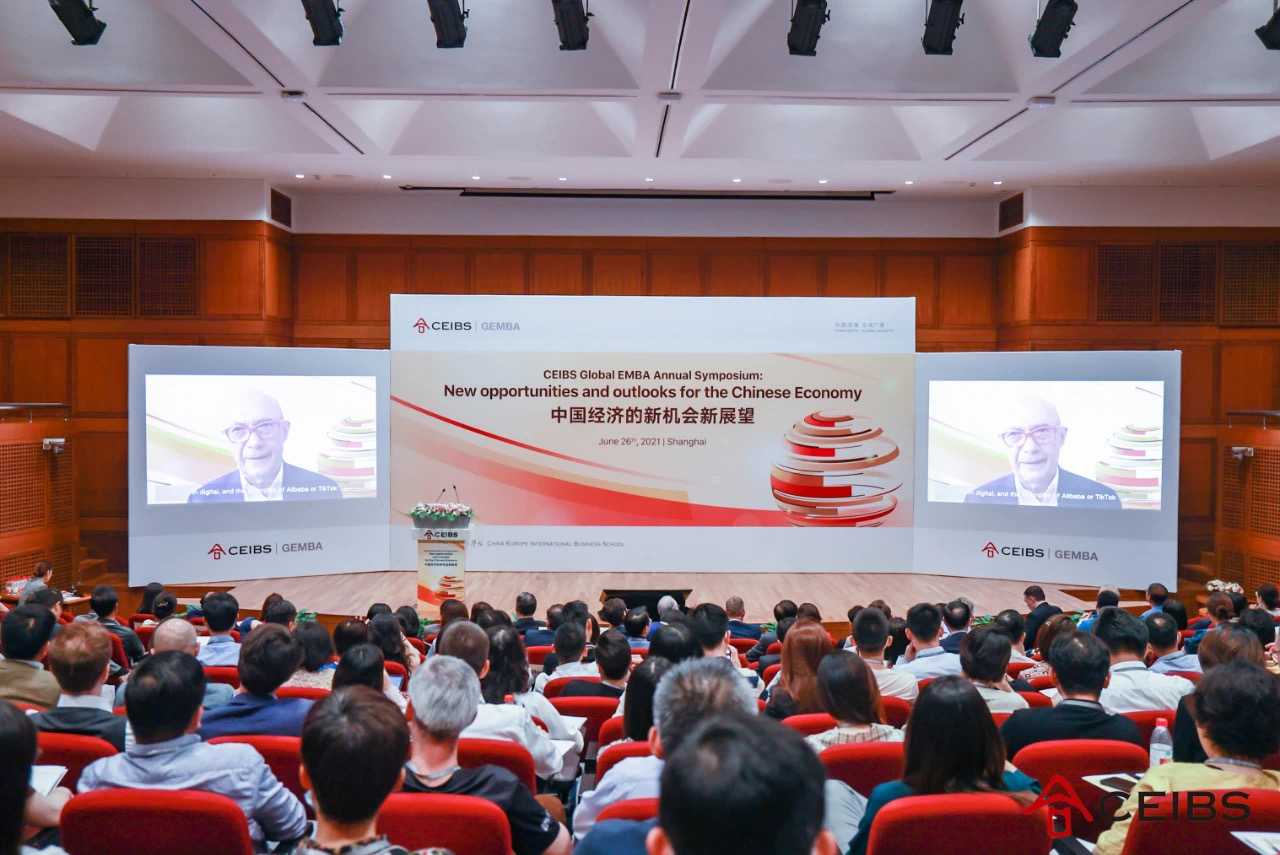China’s economic future needs engagement with foreign markets
As one of the keynote speakers for the recently held Global EMBA China Symposium, CEIBS Professor Pascal Lamy provided a breakdown of some of the most pressing challenges and opportunities regarding China's evolving role in shaping global trade.

A matter of perception – China's standing in 'The West' vs 'The Rest'
Professor Lamy's opening contention was that China's perception abroad has changed dramatically in recent years. In short, he characterised it as going through challenging times in 'The West', underlined by the ongoing (and deepening) US/China rivalry. Contrastingly, 'The Rest' of the world continues to view the Chinese model of development as highly successful, and something to be emulated. The professor pointed to China's success in increasing the value and quality of its exports, as well as its impressive post-COVID recovery so far, as quantifiable trends that its fellow BRICS nations and other countries belonging to 'The Rest' of the world view as validating proof of China's continued success.
But what does this significant change in perception mean for China's evolving global trade role, and for Chinese businesses wanting to succeed in branching out to foreign markets? For Professor Lamy, it's a question of reciprocity.
How far, and how fast, will China reach out to foreign markets?
While China's increased standing in smaller, developing markets across the rest of the world continues to open up new and invaluable trading possibilities for Chinese enterprises, the reality exists that frostier relations with 'The West' carry significant economic consequences. The West still represents roughly 50% of the world economy, in terms of markets which China can and should target. And while trade flows remain healthy in many instances, the height of the US/China tariff wars during the Trump presidency demonstrates the severity of economic disruption that can occur through turbulent relations.
Professor Lamy follows the macroeconomist school of thought that, although there is great potential in growing the domestic demand of China, for Chinese growth to remain as strong as it has been in recent times, it needs open access to outside markets. Put simply, China's growth engine needs to invest abroad and to keep exporting to the world. Accordingly, a continued dip in China/Western relations will likely translate into a slower pace of Chinese economic growth.
Competitive neutrality – Levelling the playing field when doing business in China
At the heart of Professor Lamy's assessment of China's evolving global trade role is the concept of competitive neutrality. He believes that to improve and revitalise a more positive perception of Chinese business abroad, it is essential that foreign enterprises feel they are competing on a level playing field. Rather than going up against China as a political entity, foreign companies should feel that they can experience fair competition (and collaboration) with Chinese businesses. Giving Alibaba as an example, Professor Lamy argued that when consumers engage with the company's products and services, they should feel that they have a relationship with Alibaba, not a relationship with China.
Achieving this understanding – the professor explained – is a complex and far-reaching process that begins at the top. It depends on the national, regional and local authorities in China restarting a process that makes the rest of the world believe that competing with China, doing business with China, making investments, establishing production, making import/export deals from China, will all be done on a more reciprocal basis. Closely linked to this entire process is the need for the Chinese Government to embrace 'precautionism' over protectionism – i.e.: protecting Chinese businesses from risk through fair and transparent regulatory precautions, rather than strategically limiting foreign competition through one-sided protectionist actions.
An important side issue attached to this wider trend that the professor touched on was the future direction of the renminbi. While Professor Lamy does not believe that the renminbi will challenge the US Dollar in terms of global influence in the foreseeable future, he strongly believes that it will grow as a crucial billing and investment currency. The prospect of a more internationalised renminbi – one that would be much more visible globally via a wider availability of RMB-denominated bonds, shares and other financial instruments in which foreign entities can invest – would be extremely beneficial in signalling China's will to integrate more rapidly with the global economy.
While China's future path can only be guessed at, rather than easily predicted, Professor Lamy remains optimistic that such a 'levelling of the playing field' can be achieved. He pointed to the vast and growing areas of global trade (not least the marketplace of ideas) where China and the rest of the world stand to mutually benefit from one another. From the environment, to climate, decarbonisation, mobility, water systems, ecowaste management systems and smart agriculture to name but a few, the lure of rapid progress through reciprocal trade may help mitigating political barriers.
How can Chinese businesses support an image of competitive neutrality abroad?
While the Chinese Government may be responsible for setting the overall tone and direction of China's global trade role, individual Chinese businesses can still influence the perception of foreign markets towards China. The professor described this as Chinese businesses having to attend to their own 'branding'. To make foreign business entities feel like they are competing on the previously described level playing field, Chinese enterprises must be proactive in representing themselves as being keen to do business under such conditions, rather than operating under the aegis of the powerful Chinese state.
FDI - Acquisitions
Accordingly, Chinese companies need to be seen to be reciprocal in their dealings, to want to build long-lasting and mutually beneficial ties with the foreign markets where they operate. Investing abroad, creating operations that include the production of goods and services that benefit, for instance, local employment – this kind of activity will be seen as more positive and reciprocal than simply buying or acquiring operations in foreign markets.
Relevant to this point, albeit at the more macroeconomic level, Professor Lamy pointed towards the impact of the Belt and Road Initiative. He posited that a small but important part of worsening China/Western relations is the growing perception in the West that the Belt and Road Initiative is being used by China as a device to wield influence over the countries it affects. In this light, the 'rival' G7 BBBI (Build Back Better Initiative) can be seen as a countermove by the West to check China's growing influence in neighbouring nations.
While this is how both initiatives are perceived in some quarters, Professor Lamy believes that they can also be utilised as vehicles for reciprocal growth, and subsequently improve relations between China and the West. Crucial to this kind of development is the necessity for said initiatives to tangibly benefit the partnering nations, rather than predominantly benefitting China and the G7 respectively.
A Matter of Time – The Impact of China's ageing population on its economic prospects
To finish, Professor Lamy addressed what he believes is the greatest long-term structural issue for China's economy – the country's aging population.
As China's population ages, it continues to shrink both the production and consumption base that feeds the growth of the national economy. Furthermore, the consumption habits of older people will favour goods and services that are less international in nature (such as healthcare), and hence less exportable.
This gradual yet steady shift in China's production and consumption levels has far-reaching implications for its economic prospects. While there are many ways that China can pivot on this vital issue, the professor believes that it can only heighten the importance of foreign markets in spurring Chinese economic growth, together with domestic production/consumption. If demand cannot be maintained at home, it must be sought out and satisfied abroad. Markets that are young, developing and dynamic – such as Africa, and other parts of Asia and Latin America – will play a highly influential role in balancing the equation that faces the Chinese economy.
With this in mind, Professor Lamy remains convinced that, despite ongoing major points of friction with the West, China's long-term future lies in further engagement with foreign markets. While he advocates a path of open-handed market integration characterised by competitive neutrality and precautionism (a tone established by the Chinese Government and supported by individual enterprises), how this macroeconomic trend actually develops is entirely open to debate.













